Episode Details
Back to Episodes
國際時事跟讀 Ep. L084: 中國稀土管制新局面 China's Rare Earth Gambit
Description
-----------------------------------
🎧 通勤學英語 VIP 專區 & 🚀 線上課程
-----------------------------------
💡 想要更自然的提升英語力?加入VIP會員,獲得專屬內容與優惠!
- 立即加入VIP方案 → https://15minstoday.firstory.io/join
- VIP訂閱常見問題 →https://15minsengcafe.pse.is/5cjptb
🔥 社會人核心英語有聲書課程→https://15minsengcafe.pse.is/554esm
-------------------------------
🌎 15Mins.Today 相關連結
-------------------------------
💬 你的想法很重要!留言分享 → 留言連結
Web:www.15mins.today
YouTube:https://15minsengcafe.pse.is/3rhuuy
商業合作/贊助來信:15minstoday@gmail.com
意見回覆 : ask15mins@gmail.com
--------------------------------------------
📜 單集逐字稿 & 內容摘要(播放器字數有限,完整逐字稿請到官網查看)
--------------------------------------------
國際時事跟讀VIP Ep. L084: China's Rare Earth Gambit
Highlights 主題摘要
- China added five rare earth elements to export restrictions before Trump-Xi talks.
- Foreign firms using Chinese materials must obtain export licenses.
- Defense users face denials while chip applications undergo case reviews.
China announced major rare earth export control expansions on October 9, adding five elements—holmium, erbium, thulium, europium, and ytterbium—to its restriction list. These materials are vital for manufacturing products from smartphone screens to jet engines and military radar systems. The timing appears strategic, coming weeks before Presidents Trump and Xi meet in South Korea. Beijing controls over 90% of global rare earth processing, giving it significant leverage in trade negotiations. The Ministry of Commerce also added dozens of refining technologies to the control list.
中國於10月9日宣布大幅擴大稀土出口管制,將鈥、鉺、銩、銪和鐿五種元素納入限制清單。這些材料對於製造智慧型手機螢幕、噴射引擎和軍用雷達系統等產品至關重要。時機選在川習南韓會面前數週,顯然具有戰略意圖。北京控制全球超過90%的稀土加工,在貿易談判中握有重要籌碼。中華人民共和國商務部同時將數十項精煉技術納入管制清單。
The new regulations extend Beijing's reach beyond its borders. Foreign companies producing rare earths or related magnets must obtain Chinese export licenses if their products contain Chinese equipment or materials, even when no Chinese firms are involved. This mirrors U.S. semiconductor export controls that restrict chipmaking equipment sales to China. Defense manufacturers will not receive licenses, while applications for advanced semiconductors—including 14-nanometer chips and memory chips with 256 layers or more—face rigorous scrutiny. The rules also cover artificial intelligence research with potential military applications, affecting major chipmakers in South Korea and Taiwan.
新規定將北京的管轄權延伸至境外。生產稀土或相關磁材的外國企業,若產品含有中國設備或材料就必須取得中國出口許可,即使交易中沒有中國公司參與也一樣。這種做法仿效美國的半導體出口管制,限制晶片製造設備銷往中國。國防製造商將無法獲得許可,而先進半導體申請——包括14奈米晶片及256層以上記憶體晶片——也面臨嚴格審查。規定並涵蓋具潛在軍事用途的人工智慧研究,影響了南韓和台灣的主要晶片製造商。
Analysts view the expanded controls as positioning for the upcoming summit. "This helps with increasing leverage for Beijing ahead of the anticipated Trump-Xi summit," said Tim Zhang of Edge Research. The White House expressed concern that the rules were "imposed in an apparent effort to exert control over the entire world's technology supply chains." The announcement followed U.S. lawmakers' calls for broader bans on chipmaking equipment exports to China, reflec